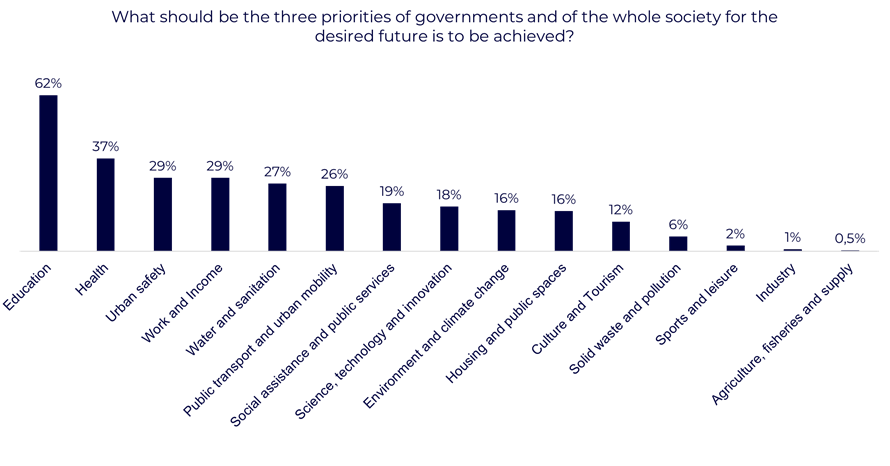Cariocas want a future with education, health, safety and work

This is what the new research conducted by the Museum of Tomorrow with residents from all regions of Rio de Janeiro shows.
By Davi Bonela and Ruy Cotia*
The future of Rio is the subject of a new research carried out by the Museum of Tomorrow. Conducted in October 2020, the study asked the population of Rio de Janeiro what priorities and proposals should be defined so that the desired future for the city and the neighbourhoods where they live can be achieved.
“Among our more than 4 million visitors, at least one million lives in the city of Rio de Janeiro. Therefore, it is important that the Museum of Tomorrow stimulates the population to think about the future of the city, in order to define a set of priorities for Rio’s development that has the contribution of its residents”, explains Ricardo Piquet, director of IDG - Institute for Development and Management, managing institution of the Museum of Tomorrow.
Education, health, safety and work must be the priorities for the future of Rio, according to cariocas
In the opinion of Cariocas, education, health, safety and work must be the main priorities for the future of Rio, respectively with 62%, 37% and the last two with 29%. Next, water and sanitation had 27% of the adhesion of cariocas and public transport and urban mobility, 26%.

Cariocas chose three out of fifteen priorities inspired by the City Master Plan
Education is the main priority for Cariocas in general, and when the results are compared between the different regions of the city - North, West, South and Downtown.
From building schools, nurseries, and hospitals to increasing jobs, Cariocas present their proposals for the future of the city
After choosing priorities for the future of Rio, Cariocas suggested proposals to put them into practice. For education, the most suggested proposals are the construction of schools and nurseries, the increase in the salary of education professionals, the improvement of teaching infrastructure, the qualification of education professionals and the increase workloads in schools.
In the health area, the suggested actions include the construction of hospitals and health centers, the improvement of the infrastructure of existing hospitals, the increase in the supply of care, the qualification of health professionals and the investment in preventive health.
For urban security, Cariocas propose to increase policing on city streets, fight corruption in all of its forms, fight organized crime and increase salaries for public security professionals.
And for work and income, the most suggested proposals were the creation of new jobs, income distribution projects, professional qualification projects and increased opportunities for those who do not yet have professional experience.
The Tomorrow of Rio
Carried out in October 2020, The Tomorrow of Rio is a research conducted by the Research Coordination of Museum of Tomorrow | IDG with the aim to analyse the desires, priorities and proposals of the Cariocas in relation to the future of the city and the neighbourhoods where they live.
The research, with both quantitative and qualitative objectives, consists of 28 open and closed-ended questions and the recruitment of participants was done via email and social networks. The responses were collected and stored using the Typeform software.
To represent the perception of Cariocas, this research sought an audience that reproduces the division of the population in the planning regions of Rio de Janeiro: 45% residents of the North Zone, 40% residents of the West Zone, 10% residents of the South Zone and 5% residents of the Downtown, according to demographic data from IBGE. With about 400 participants, the representative sample of Cariocas in this research was built with 220 people, which guarantees a margin of error of 6.6%, at a confidence level of 95%. In addition to the region of residence, the profile of the sample is also representative of the resident of Rio with regard to sex, age, colour, income and education, and for the latter a weighting was performed to correct the size of the under-represented strata (strata whose difference between sample and population was greater than 3%).
Check out the research results here.
By Davi Bonela, Research coordinator, and Ruy Cotia, Audience research analyst at Museum of Tomorrow | IDG - Institute for Development and Management, authors of the research.
Museum of Tomorrow is an Applied Sciences museum which explores the opportunities and challenges which humanity will be forced to tackle in the coming decades from the perspective of sustainability and conviviality. Launched December 2015 by Rio de Janeiro City Hall, Museum of Tomorrow is a Culture asset from Rio's Secretary of Culture currently managed by Instituto de Desenvolvimento e Gestão (IDG). Example of a well-succeeded partnership between public power and private initiative, it has already received over three million visitors since opening. With Santander Bank as a Master Sponsor and a wide network of partner sponsors as Shell, IBM, IRB-Brasil RE, Engie, Grupo Globo and Instituto CCR, the museum was originally conceived by Roberto Marinho Foundation.